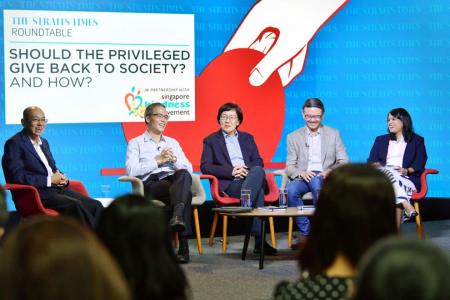Spotlight on issue of giving back to society
Panel discussion on privilege in Singapore and giving back to society raises key issues
Could better work-life balance be the key to getting Singaporeans to give back to society? Why are the wealthy here not doing more to help the poor? And is Singapore a society where people live in their own "cocoons", sheltered from the realities of inequality?
These were among the key issues raised yesterday during a panel discussion organised by The Straits Times in partnership with the Singapore Kindness Movement, on the topic of privilege in Singapore and giving back to society.
On the panel moderated by ST editor-at-large Han Fook Kwang were Singapore Management University professor of sociology (practice) Paulin Straughan, Beyond Social Services' deputy executive director T. Ranganayaki, Lien Foundation chairman Laurence Lien and HealthServe's co-founder and chairman Goh Wei Leong.
Mr Lien said that giving in Singapore has stagnated, and that the wealthy could do more. "I think the wealthy are not giving enough... If you look at the Forbes 50 list of Singaporeans, only one in five is known to have foundations (and) the amounts they are giving are not substantial," he said.
But it is not just the wealthy who should contribute, he noted, citing a falling donation rate in the Republic. Mr Lien said: "Giving needs to be part of the (national) DNA, so it's not just the wealthy who should be giving. If you don't give when you're poor, you won't give when you're rich."
He also rebutted the notion that the Republic's urban nature means it is not possible for Singaporeans to live in their own "cocoons".
"Just because you sometimes visit hawker centres and see old people cleaning up (doesn't mean) you know the stories they carry with them," he said.
Professor Straughan agreed. "The more dangerous levers of inequality are the ones behind closed doors... We don't see them, and therefore we assume that it's okay," she said, pointing to issues such as inter-generational transfers of poverty, or people overworking due to insufficient income.
She also highlighted the need for better work-life balance in getting Singaporeans to think about others.
"If you don't have sufficient time, you tend to be a lot more self-centred because you're always worried... but when we have that space and time to think, then we can start to do a lot more with our own contribution," she said.
Get The New Paper on your phone with the free TNP app. Download from the Apple App Store or Google Play Store now


